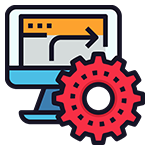who Cloud Engineer is

Cloud Engineers play a crucial role in modern IT infrastructures, as cloud computing has become the backbone of many organizations’ digital transformation initiatives. Their expertise in cloud technologies and infrastructure helps businesses leverage the benefits of the cloud, such as scalability, flexibility, and cost-effectiveness, to achieve their business objectives and stay competitive in today’s rapidly evolving technology landscape.
In which areas is Cloud Engineer most beneficial?
Cloud Engineers are most beneficial in the following areas:
- Cloud Infrastructure Design: Cloud Engineers excel at designing scalable, reliable, and high-performance cloud architectures to meet the specific needs of applications and workloads.
- Cloud Migration: They are instrumental in assisting organizations with the smooth transition of their on-premises applications and data to the cloud, ensuring a seamless migration process.
- DevOps and Automation: Cloud Engineers play a vital role in implementing DevOps practices and automation to streamline cloud infrastructure deployment and management, enabling continuous integration and continuous deployment (CI/CD) pipelines.
- Cloud Security: They specialize in ensuring the security of cloud environments, implementing proper access controls, encryption, and compliance measures to protect sensitive data and meet industry regulations.
- Cost Optimization: Cloud Engineers focus on optimizing cloud resource usage to minimize costs while ensuring resources align with application demands, helping organizations get the most value from their cloud investments.
- Cloud Monitoring and Troubleshooting: They excel at monitoring cloud infrastructure performance and proactively identifying and resolving issues, ensuring high availability and optimal performance of cloud-based services.
- Multi-Cloud and Hybrid Cloud Environments: Cloud Engineers have expertise in managing multi-cloud and hybrid cloud environments, allowing businesses to leverage the best features of different cloud providers and technologies.
- Disaster Recovery and Business Continuity: They implement disaster recovery and backup solutions in the cloud to protect against data loss and ensure business continuity in the event of system failures or disasters.
- Cloud Governance: Cloud Engineers establish and enforce best practices, policies, and guidelines for cloud usage within organizations, ensuring compliance and adherence to industry standards.
- Cloud Strategy and Consultation: They collaborate with development teams and stakeholders to define cloud strategies and recommend the most suitable cloud solutions for achieving business goals.


 Polish developers often have excellent language skills, including proficiency in English, which facilitates communication with international clients. They are also known for their ability to adapt quickly to new technologies and project requirements. When hiring developers in Poland, you have access to a talent pool with a diverse set of skills and expertise, making it an attractive destination for businesses seeking top-notch software development services.
Polish developers often have excellent language skills, including proficiency in English, which facilitates communication with international clients. They are also known for their ability to adapt quickly to new technologies and project requirements. When hiring developers in Poland, you have access to a talent pool with a diverse set of skills and expertise, making it an attractive destination for businesses seeking top-notch software development services. 
 Ukraine is known for having a strong and growing IT industry, and there are many skilled developers available in the country. Ukrainian developers are sought after for their expertise, proficiency in English, and competitive rates compared to developers in other countries.
When hiring developers in Ukraine, you can find individual freelancers, or you can work with software development companies that offer a team of developers with different skillsets. It’s essential to conduct thorough research, review portfolios, and conduct interviews to find the right fit for your project and requirements. Additionally, keep in mind any legal and contractual considerations when hiring developers from abroad.
Ukraine is known for having a strong and growing IT industry, and there are many skilled developers available in the country. Ukrainian developers are sought after for their expertise, proficiency in English, and competitive rates compared to developers in other countries.
When hiring developers in Ukraine, you can find individual freelancers, or you can work with software development companies that offer a team of developers with different skillsets. It’s essential to conduct thorough research, review portfolios, and conduct interviews to find the right fit for your project and requirements. Additionally, keep in mind any legal and contractual considerations when hiring developers from abroad. 
 A QA Automation Engineer, also known as a Test Automation Engineer, is a software professional responsible for designing, developing, and implementing automated test scripts and frameworks to facilitate the testing process. QA Automation Engineers use specialized tools and programming languages to automate repetitive and manual testing tasks, enabling faster and more efficient testing of software applications and systems.
QA Automation Engineers play a critical role in the software development lifecycle by accelerating testing cycles, improving test accuracy, and reducing manual efforts. Their expertise in test automation tools and programming languages allows them to focus on more challenging aspects of testing, enabling faster feedback and higher overall software quality. Additionally, automation helps ensure that testing remains consistent across releases and helps uncover defects early in the development process, contributing to efficient and reliable software delivery.
A QA Automation Engineer, also known as a Test Automation Engineer, is a software professional responsible for designing, developing, and implementing automated test scripts and frameworks to facilitate the testing process. QA Automation Engineers use specialized tools and programming languages to automate repetitive and manual testing tasks, enabling faster and more efficient testing of software applications and systems.
QA Automation Engineers play a critical role in the software development lifecycle by accelerating testing cycles, improving test accuracy, and reducing manual efforts. Their expertise in test automation tools and programming languages allows them to focus on more challenging aspects of testing, enabling faster feedback and higher overall software quality. Additionally, automation helps ensure that testing remains consistent across releases and helps uncover defects early in the development process, contributing to efficient and reliable software delivery. 
 A Manual QA (Quality Assurance) Engineer, also known as a Software Tester or QA Analyst, is a professional responsible for ensuring the quality and functionality of software applications and systems. Unlike automated testing, manual QA involves human intervention in executing test cases and verifying the software’s behavior against specified requirements.
Manual QA Engineers play a crucial role in ensuring the reliability, functionality, and user-friendliness of software applications before they are released to end-users. They provide valuable feedback to the development team, helping to improve the quality of the software and ensure a positive user experience. Manual testing is particularly useful for smaller projects or for scenarios where automated testing is not feasible or cost-effective. However, it may require more effort and time compared to automated testing for larger and more complex projects.
A Manual QA (Quality Assurance) Engineer, also known as a Software Tester or QA Analyst, is a professional responsible for ensuring the quality and functionality of software applications and systems. Unlike automated testing, manual QA involves human intervention in executing test cases and verifying the software’s behavior against specified requirements.
Manual QA Engineers play a crucial role in ensuring the reliability, functionality, and user-friendliness of software applications before they are released to end-users. They provide valuable feedback to the development team, helping to improve the quality of the software and ensure a positive user experience. Manual testing is particularly useful for smaller projects or for scenarios where automated testing is not feasible or cost-effective. However, it may require more effort and time compared to automated testing for larger and more complex projects. 


 A backend developer, also known as a server-side developer, is a software engineer who specializes in building and maintaining the server-side components of web applications or software systems. Backend developers work behind the scenes to handle data storage, server logic, and communication with the front-end (client-side) of the application.
Backend developers play a critical role in ensuring the functionality, security, and performance of web applications and software systems. They work closely with front-end developers, database administrators, and other team members to deliver a complete and seamless user experience. Their expertise in server-side technologies and programming languages allows them to handle complex data processing and server operations efficiently.
A backend developer, also known as a server-side developer, is a software engineer who specializes in building and maintaining the server-side components of web applications or software systems. Backend developers work behind the scenes to handle data storage, server logic, and communication with the front-end (client-side) of the application.
Backend developers play a critical role in ensuring the functionality, security, and performance of web applications and software systems. They work closely with front-end developers, database administrators, and other team members to deliver a complete and seamless user experience. Their expertise in server-side technologies and programming languages allows them to handle complex data processing and server operations efficiently. 
 A data scientist is a professional who uses scientific methods, algorithms, and statistical techniques to extract insights and knowledge from large and complex sets of data. Data scientists play a crucial role in analyzing and interpreting data to inform business decisions, solve problems, and discover patterns, trends, and correlations.
Data scientists are in high demand across various industries, including technology, finance, healthcare, e-commerce, marketing, and more. Their expertise in data analysis and machine learning enables organizations to leverage data effectively, gain a competitive advantage, and make informed decisions to achieve their goals and objectives.
A data scientist is a professional who uses scientific methods, algorithms, and statistical techniques to extract insights and knowledge from large and complex sets of data. Data scientists play a crucial role in analyzing and interpreting data to inform business decisions, solve problems, and discover patterns, trends, and correlations.
Data scientists are in high demand across various industries, including technology, finance, healthcare, e-commerce, marketing, and more. Their expertise in data analysis and machine learning enables organizations to leverage data effectively, gain a competitive advantage, and make informed decisions to achieve their goals and objectives. 
 A Drupal developer is a software engineer who specializes in developing websites and web applications using the Drupal content management system (CMS). Drupal is a powerful and widely used open-source CMS that allows developers to create dynamic, scalable, and feature-rich websites with ease.
Drupal developers are in demand due to Drupal’s flexibility, scalability, and ability to handle complex web projects. Their expertise in Drupal development enables them to create robust and user-friendly websites for businesses, government organizations, educational institutions, and various other sectors.
A Drupal developer is a software engineer who specializes in developing websites and web applications using the Drupal content management system (CMS). Drupal is a powerful and widely used open-source CMS that allows developers to create dynamic, scalable, and feature-rich websites with ease.
Drupal developers are in demand due to Drupal’s flexibility, scalability, and ability to handle complex web projects. Their expertise in Drupal development enables them to create robust and user-friendly websites for businesses, government organizations, educational institutions, and various other sectors. 
 An Android developer is a software engineer who specializes in building applications for the Android operating system. Android is a widely used mobile operating system developed by Google, and it powers a vast majority of smartphones and tablets worldwide.
An Android developer is a software engineer who specializes in building applications for the Android operating system. Android is a widely used mobile operating system developed by Google, and it powers a vast majority of smartphones and tablets worldwide.